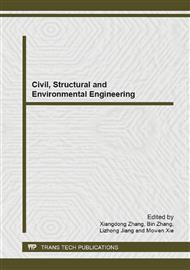[1]
X.L. Qiao, Y.M. Luo, S.C. Wu, Application of sludge on land and its environmental effects, Soils. 32(2000)79-85(In Chinese).
Google Scholar
[2]
J.B. Yang, R.B. Jia, Research Progress of resource utilization of urban sewage sludge. Industrial Water&Wastewater. 42(2011)1-5(In Chinese).
Google Scholar
[3]
X.L. Zhang, Y. E, Z.B. Hu, et al, Distribution of Heavy Metals in Sludge-Amended Soils and Maize. Chinese Journal of Soil Science. 41(2010)479-484(In Chinese).
Google Scholar
[4]
C.H. Mo, Q.T. Wu, Q.Y. Cai, et al, Utilization of municipal sludge in agriculture and sustainable development, Chinese Journal of Applied Ecology, 11(2000)157-160(In Chinese).
Google Scholar
[5]
N. Ma, L. Chen, P.S. He, et al, Study on resource reuse of municipal sewage sludge. Chinese Journal of Ecology. 23(2004) 86-89(In Chinese).
Google Scholar
[6]
H. Veeresh, S. Tripathy, D. Chaudhuri, et al, Changes in physical and chemical properties of three soil types in India as a result of amendment with fly ash and sewage sludge, Environ. Geol, 43(2003)513-520.
DOI: 10.1007/s00254-002-0656-2
Google Scholar
[7]
T.B. Chen, G.D. Zhen, D. Gao, et al, Key problems in municipal sludge composting and its industrialization process, China Water & Waste Water. 25(2009)104-108(In Chinese).
Google Scholar
[8]
L.X. Zhou, A.T. Hu, N.F. Ge, et al, Study on utiliziation of municipal sewage sludage in farmland and forest land, Acta Ecologica Sinica, 19(1999)185-193.
Google Scholar
[9]
I. Walter, F. Martinez, V. Cala, Heavy metal speciation and phytotoxic effects of three representative sewage sludges for agricultural uses, Environmental Pollution. 139(2006) 507-514.
DOI: 10.1016/j.envpol.2005.05.020
Google Scholar
[10]
S.R. Smith. Agricultural Recycling of Sewage Sludge and the Environment, Guildford (UK) : CAB International, (1996).
Google Scholar
[11]
J. Weber, A. Karczewska, J. Drozd, M. Licznar, S. Licznar, E. Jamroz, et al, Agricultural and ecological aspects of a sandy soil as affected by the application ofmunicipal solid waste composts. Soil Biol. Biochem. 39(2007)1294–1302.
DOI: 10.1016/j.soilbio.2006.12.005
Google Scholar
[12]
H. Cai et al, The effect of salinity and porosity of sewage sludge compost on the growth of vegetable seedlings, Scientia Horticulturae. 124 (2010) 381-386(In Chinese).
DOI: 10.1016/j.scienta.2010.01.009
Google Scholar
[13]
M.K. Turkogan, F. Kilcel, K. Kara, et al, Heavy metals in soil, vegetables and fruits in the endemic upper gastrointestinal cancer region of Turkey, Environ. Toxicol. Pharm, 13(2003)175-179.
DOI: 10.1016/s1382-6689(02)00156-4
Google Scholar
[14]
Agricultural chemical professional committee of China soil society, Soil and agricultural chemical conventional analysis method, Science Press, Beijing, 1983(In Chinese).
Google Scholar
[15]
X. Wang, T. Chen, Y.H. Ge, Y.F. Jia. Studies on land application of sewage sludge and its limiting factors, Journal of Hazardous Materials. 160 (2008) 554-558.
DOI: 10.1016/j.jhazmat.2008.03.046
Google Scholar
[16]
B.L. Abdel, A.L. Maria, et al, Effect of municipal solid waste compost and sewage sludge use on wheat (Triticum durum): growth, heavy metal accumulation, and antioxidant activity, J Sci Food Agric, 90( 2010)965–971.
DOI: 10.1002/jsfa.3904
Google Scholar
[17]
X. Chen, B. Bao, et al, Effects of Three Sewage Sludges on Two Ground Cover Plants and Soil, Journal of Southwest University (Natural Science Edition). 31(2009) 130-133(In Chinese).
Google Scholar


